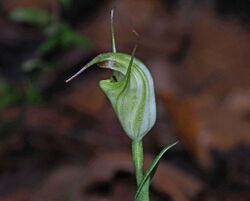Biology:Pterostylis atrans
| Dark-tip greenhood | |
|---|---|

| |
| Pterostylis atrans growing near Mount Toolebewong | |
| Scientific classification | |
| Kingdom: | Plantae |
| Clade: | Tracheophytes |
| Clade: | Angiosperms |
| Clade: | Monocots |
| Order: | Asparagales |
| Family: | Orchidaceae |
| Subfamily: | Orchidoideae |
| Tribe: | Cranichideae |
| Genus: | Pterostylis |
| Species: | P. atrans
|
| Binomial name | |
| Pterostylis atrans | |
| Synonyms[1] | |
|
Diplodium atrans (D.L.Jones) D.L.Jones & M.A.Clem. | |
Pterostylis atrans, commonly known as the dark-tip greenhood[2] or blunt-tongue greenhood,[3] is a species of orchid endemic to south-eastern Australia . As with similar greenhoods, plants in flower differ from those that are not flowering. The non-flowering plants have a rosette of leaves flat on the ground, but the plants in flower have a single flower with leaves on the flowering spike. In this species, the flower is green and reddish brown with a protruding sinus and small club-like tips on the ends of the lateral sepals.
Description
Pterostylis atrans is a terrestrial, perennial, deciduous, herb with an underground tuber and when not flowering, a rosette of egg-shaped leaves, each leaf 10–35 mm long and 10–30 mm wide. Flowering plants have a single flower 14–20 mm long and 10–12 mm wide borne on a spike 150–300 mm high with between three and five spreading stem leaves. The flowers are green with a reddish-brown, down curved tip. The dorsal sepal and petals are fused, forming a hood or "galea" over the column and the dorsal sepal has a thread-like tip 6–9 mm long. The lateral sepals are held closely against the galea, have erect, thread-like tips 15–20 mm long with small club-like tips and a protruding, platform-like sinus between their bases. The labellum is 9–11 mm long, about 3 mm wide, green with a blunt brown tip that is just visible above the sinus. Flowering occurs from November to April.[2][3][4]
Taxonomy and naming
Pterostylis atrans was first formally described in 1994 by David Jones from a specimen collected in the Brindabella Range. The description was published in Muelleria.[1][4] The specific epithet is "from the Latin word atrans, darkening, in reference to the dark red-brown colouration towards the apex of the galea".[2]
Distribution and habitat
The dark-tip greenhood mostly grows among grasses in high rainfall forests in Victoria, Tasmania and southern New South Wales.[2][3][5]
References
- ↑ 1.0 1.1 1.2 "Pterostylis atrans". APNI. https://id.biodiversity.org.au/instance/apni/486366. Retrieved 3 May 2017.
- ↑ 2.0 2.1 2.2 2.3 Jones, David L. (2006). A complete guide to native orchids of Australia including the island territories. Frenchs Forest, N.S.W.: New Holland. p. 288. ISBN 978-1877069123.
- ↑ 3.0 3.1 3.2 Jeanes, Jeff. "Pterostylis atrans". Royal Botanic Gardens Victoria: vicflora. https://vicflora.rbg.vic.gov.au/flora/taxon/95715bb7-9d88-44d1-8a8d-af690ae33e13. Retrieved 3 May 2017.
- ↑ 4.0 4.1 Jones, David L. (1994). "A new species of Orchidaceae from Victoria". Muelleria 8 (2): 185–186. https://www.rbg.vic.gov.au/documents/Muelleria_8(2),_p177-192,_Jones,_new_Orchidaceae.pdf. Retrieved 3 May 2017.
- ↑ Jones, David L. (1998). "Contributions to Tasmanian Orchidology - 7". Australia Orchid Research 3: 139–140.
Wikidata ☰ Q15491876 entry
 |

